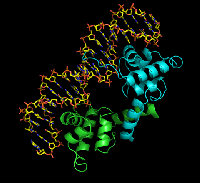Proteomic Analysis of the Human Serum Proteome for Population Screening, Diagnosis and Biomarker Discovery |
||
| Page 1 | Page 2 | Page 3 |
A joint project between University College London, the Ludwig Institute for Cancer Research and the CLRC |
||
About the Project |
||
|
There is broad agreement that analysis of the human serum proteome has
great potential for diagnosis and early detection of human disease. The
challenges are immense given the complexity of the human proteome and
the broad dynamic range in abundance of individual proteins. The key to
unlocking this potential is the development of reproducible, sensitive
and specific technology for proteomic analysis. Recent advances in technology
suggest that this may now be feasible. Several groups, including our own, have demonstrated the potential power of proteomic techniques for the discovery of novel disease biomarkers from complex body fluids. In the past two years, a number of studies have investigated the use of mass spectrometry based methods for early cancer detection from human serum through "proteomic pattern diagnostics." These studies have been criticised because of inconsistencies between the biomarkers identified in similar studies and when compared with classical immunological testing as well as the choice of cancer and control samples. It is also clear that there is insufficient data about the effect of different methods of sample handling on this technology as well as its analytical reproducibility, sensitivity and specificity. Finally, most of the work to date has focused on pattern recognition with little effort directed at establishing the identity of specific biomarkers. This study focuses on a unique serum bank collected from 200,000 postmenopausal
women utilising existing and cutting edge proteomic technology and state-of-the-art
bioinformatics. The results will provide a sound basis for assessing the
screening and diagnostic potential of the serum proteome, establishing
the identity of the discriminitive proteins and linking the findings to
parallel genomic studies. |
||
People |
||
He combines a clinical role as a surgeon in the treatment of gynaecological cancers with running a large research program to develop new strategies for prevention, screening and treatment of these cancers. Key components of the research programme involve studies of molecular carcinogenesis, tumour biology, cancer markers and national trials of ovarian cancer screening in the general and high risk populations (UKCTOCS and UKFOCSS). Ian undertook his medical training in Cambridge and at the Middlesex Hospital, London. He combined this with a research training including an MD at London University, an MRC Fellowship at Duke University, USA and a CRC Fellowship at Cambridge University. He then completed his clinical training with an RCOG specialist Fellowship in Gynaecological Oncology at St Bartholomew's Hospital and The Royal Marsden Hospitals. In 1996 he was appointed as a Consultant Gynaecological Cancer Surgeon at St Bart's and the Royal London Hospitals and in 1999 he was made a Professor of Gynaecological Oncology and Head of the Department of Obstetrics & Gynaecology at Bart's and the London School of Medicine. In 2002 he was appointed Associate Research Dean and Director of the Cancer Institute at Bart's and The London. Ian moved his research team to University College London in April 2004 to take up his current role. Ian was President of the British Gynaecological Cancer Society from 2001-2004 and is President-Elect of the European Society of Gynaecological Oncologists. He founded the Gynaecology Cancer Research Fund in 1985 and is currently Medical Director of the Eve Appeal and a Trustee of the Helene Harris Memorial Trust. He has been a Trustee of Ovacome and Wellbeing. |
||
|
Mike's laboratory programme has focused for several years on growth factor triggered receptor mediated signal transduction processes and the subversion of these pathways which take place in cancer cells. Since 1992, his group has been characterising the family of phosphatidylinositol 3-kinases which generate phosphoinositide 2nd messengers modified in the 3 position of the Inositol ring. Through biochemical purification, sequence analysis, cloning and expression we have provided tools and reagents for a programme of research which includes structure function studies, linked to an industrial collaboration (with Peter Parker FRS , Cancer Research UK) designed to discover specific inhibitors of these 3-kinases. Recently potential lead compounds have been discovered and his team plans to take these through pre-clinicals with Professor Workman (ICR and CRUK). Recently the programme has been transferred to the Biotech start-up company, Piramed Limited, which achieved startup funding of $15 million and now has a major collaborative agreement with Genentech. The company has 38 staff. At the LICR Proteomic unit an academic proteome project which uses the laboratory staff's expertise in tyrosine kinase and their inhibitors and PI3K enzymology and inhibitors to develop methods to monitor tumour therapeutic models in mice and then for patient's trials in man is underway. A new initiative started in 2002 at LICR is the creation of a Biomedical Mass Spectrometry laboratory and a Proteomics facility. We have set up high throughput 2d DIGE and capillary HPLC systems for analysis of differential protein expression and for protein purification as an adjunct to high resolution Mass Spectrometry based analysis of protein sequence and covalent modification. The system will be used for the study of breast cancer and the role of the PI3K pathway and is designed to discover new diagnostic Biomarkers by analysing differential protein expression as part of a co-ordinated programme of genotyping, proteomes and transcriptional profiling. A team of collaborators including oncologists, pathologists, cell biologists, biochemists, analytical chemists and bioinformatics experts will work on this project. |
||
 Professor
Alex Gammerman leads the Mathematics group. Professor Gammerman studied
in Leningrad (now St Petersburg), was awarded his PhD in 1974, and then
worked in several Research Institutes of the Academy of Science of the USSR.
In 1983 he moved to Great Britain and worked first as a Lecturer and then
as a Reader at Heriot-Watt University, Edinburgh. He was appointed to the
established Chair in Computer Science at University of London ( Royal Holloway
and Bedford New College) in 1993 and served as Head of the Computer Science
Department from 1995 until 2005. He is also the Director of the Computer
Learning Research Centre at Royal Holloway, University of London. Professor
Alex Gammerman leads the Mathematics group. Professor Gammerman studied
in Leningrad (now St Petersburg), was awarded his PhD in 1974, and then
worked in several Research Institutes of the Academy of Science of the USSR.
In 1983 he moved to Great Britain and worked first as a Lecturer and then
as a Reader at Heriot-Watt University, Edinburgh. He was appointed to the
established Chair in Computer Science at University of London ( Royal Holloway
and Bedford New College) in 1993 and served as Head of the Computer Science
Department from 1995 until 2005. He is also the Director of the Computer
Learning Research Centre at Royal Holloway, University of London.
Professor Gammerman is a Fellow of the Royal Statistical Society, Fellow of the Royal Society of Arts, Member of British Computer Society . He chaired and participated in organising committees of many international conferences and workshops on Machine Learning and Bayesian methods in Europe, Russia and in the United States. He is also a member of the editorial board of the Law, Probability and Risk journal. Professor Gammerman's current research interest lies in field of Algorithmic Randomness Theory and its applications to machine learning, the development of inductive/transductive confidence machines and intelligent data analysis. Areas in which these techniques have been applied include medical diagnosis, forensic science, genomics, environment and finance. Professor Gammerman has published over a hundred research papers and several books on computational learning and probabalistic reasoning. |
||
Publications |
||
|
||
Tel/Fax : +44 (0)1784 443421 /439786



 Professor
Mike Waterfield leads the Biochemistry group. He is the Director of the
Proteomics Laboratory, Ludwig Institute for Cancer Research and the Courtauld
Professor of Biochemistry and Molecular Biology at University College
London. Mike was the Head of Department of Biochemistry and Molecular
Biology at University College London from 1991 until 2002.
Professor
Mike Waterfield leads the Biochemistry group. He is the Director of the
Proteomics Laboratory, Ludwig Institute for Cancer Research and the Courtauld
Professor of Biochemistry and Molecular Biology at University College
London. Mike was the Head of Department of Biochemistry and Molecular
Biology at University College London from 1991 until 2002.